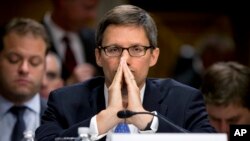"Too little too late" has been a common refrain on Capitol Hill regarding America’s response to the Russian-Ukrainian conflict, and one repeated Wednesday by Republican Senator Bob Corker as he and fellow members of the Senate Foreign Relations Committee grilled senior U.S. officials.
While the Obama administration insists that steps taken to punish Russia’s intervention in Ukraine are having an impact, and that it stands ready to impose tougher sanctions as events in Eastern Europe dictate, lawmakers of both parties at a hearing appeared skeptical.
“I am embarrassed for us," said Corker. "We know that we are not going to act. We do not act. I think our country acting like such a paper tiger to the world on this and so many other fronts is doing incredible long term damage to our nation."
But an administration official argued America is far from passive in the face of Russian aggression. Assistant Secretary of State for European Affairs Victoria Nuland touted U.S. sanctions imposed earlier this year.
“We are ready to impose more costs, including targeted sector-specific sanctions, very soon if Russia does not decisively change course and break its support for separatists. As Russia’s economy teeters on the brink of recession — in part from the cost of its intervention in Ukraine, and the impact of our sanctions — Russians need to ask themselves what their government’s policy has really delivered for them or for the people of Ukraine," said Nuland.
Even so, Assistant Secretary of Defense for International Security Affairs Derek Chollet conceded Russia’s posture towards Ukraine changed only a little.
“We remain deeply concerned about the security situation in Ukraine’s east, where the Russian military remains very active in facilitating the movement of forces, equipment, and finances across the border. Additionally, Russian irregular forces and Russian-backed local separatists remain active inside eastern Ukraine, and both are supported by Russian financing," said Chollet.
Committee Chairman Robert Menendez, a Democrat, said Moscow is betting the world will lose interest and forget events in Urkaine, noting, “Nobody even talks about Crimea anymore.”
“Time is on [Russian President Vladimir] Putin’s side. Putin does not have to win today. He only needs to generate a frozen conflict in eastern Ukraine that he can exploit when the world has moved on," said Menendez.
The State Department’s Nuland said Moscow is miscalculating if it thinks its actions will trigger no consequences. She predicted Western European support for another round of U.S.-led sanctions targeting specific Russian economic sectors if intervention in Ukraine continues.




